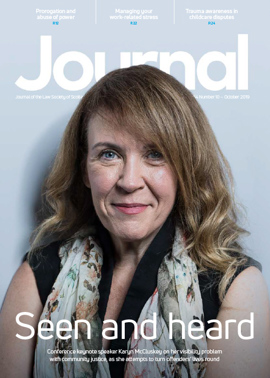Opinion: Ian Maxwell
If Scotland is to become “the best place in the world to grow up” as claimed in the Government’s National Parenting Strategy, it also needs to have the best family laws and family courts in the world.
When families split up, as so many unfortunately do, the Children (Scotland) Act 1995 stands ready to resolve disputes between separated parents in a way that is in the best interests of their children.
Unfortunately, court actions (and pre-court correspondence between solicitors) can sometimes take far too long, cost too much money (private or public), and end up making the dispute worse as allegations and counter allegations flying between the parties become the currency of securing or controlling parenting time with their children. It’s an adversarial process that we feel lacks emotional intelligence.
Such delays were criticised by Lord Glennie in SM v CM [2017] CSIH 1, where he stated: “The time taken to resolve disputes about contact should be measured not in years but in weeks or, at most, months.”
The courts also sometimes struggle to enforce contact orders once they are made.
The recently published Children (Scotland) Bill goes some way towards updating and modernising the 1995 Act, and it does mention the need for speed.
But it is a missed opportunity to transform Scottish family law into a world leading position. Gender equality is the watchword of so much Scottish Government policy and encouragement, but seems to stop dead when parents separate.
Terminology is important. We will be urging a change from “residence orders” and “contact orders”, terminology that not only permits one parent to make unilateral decisions on important issues but spills over into relations with school and health providers. We will propose “parenting” or “children’s” orders, or even “general issue” orders.
Changing the law doesn’t change perceptions immediately. After all, people still talk about custody and access even though these terms disappeared from Scots law in 1995.
But the label will help everyone focus on parenting rather than arguing.
Moving to more radical ideas, why can’t this bill be used to guide sheriffs and judges to take a different starting point for allocation of parenting time?
A rebuttable presumption of shared care was introduced in Belgian family law in 2006 and has led to about 50% of court orders being made for shared care.
Setting the starting point doesn’t remove the power of the sheriff or judge to order any appropriate division of time the child spends with each parent according to safety and suitability.
It does mean that the full involvement of both parents is taken seriously and moves the process away from the pursuer/defender battleground if both are capable and loving parents and their children have equal expectations of both.
Scotland currently lags behind many other European countries in terms of the levels of shared care found in separated families. We also lag behind these countries in important measures of children’s wellbeing, physical health and educational achievement.
One of the leading shared parenting nations is Sweden, where 50:50 joint physical custody has grown from 2% in 1984 to 35% in 2013. Swedish research shows that the children whose care is shared between two homes are significantly less likely to report health problems, have fewer psychosomatic complaints, lower stress, and lower incidence of smoking and skipping breakfast than children living in the sole care of one parent.
Changing the law doesn’t alter everything. The Scottish Government is also working on its Family Justice Modernisation Strategy in order to put more stress on dispute resolution outside the courts and provide extra support for separating families.
But the courts will continue to have the important role of making decisions about children when their parents cannot reach agreement. At Families Need Fathers Scotland (soon to be renamed Shared Parenting Scotland), we suggest this bill is an opportunity to ensure that this task happens speedily, cost effectively and with a stronger emphasis on shared parenting alongside child safety as contributors to children’s wellbeing. We see it as a public health matter as much as legal reform that will give substance to that aspiration of being the best place in the world to grow up. We need to mean it.
Regulars
Features
Briefings
- Law fair for the high street
- It's time for home truths
- No hope at age 16?
- Drug driving
- Licensing and the public health objective
- Constructing the new framework
- Scottish Solicitors' Disipline Tribunal
- Calling-up: the questions continue
- Reverse charge: don't sit back
- The anomaly that is immigration bail






